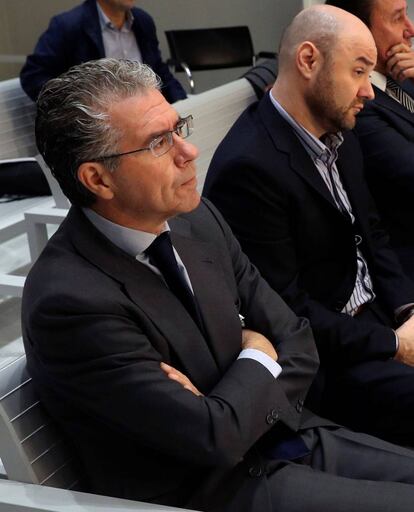The Popular Party in the dock
The corruption cases involving the party that are currently making their way through the courts are proof of the independence of the Spanish justice system

Any attempt by the governing Popular Party (PP) to distance itself from its former treasurer Luis Bárcenas, and the alleged slush fund he ran for the group, has invariably run into the mistrust of citizens and the common sense view that goes hand-in-hand with any corruption scandal. But this time, the PP has not come up against an intangible, but rather with the determination of the Madrid provincial High Court to prosecute the party for allegedly destroying the computers that had been used by Bárcenas.
In contrast to the criteria of the provincial public prosecutor, who was trying to bury the matter, and in spite of the loss of documents relating to the affair, the court has listened to the private prosecutors in the case – headed up by the United Left political party, the Observatory of Economic, Social, and Cultural Rights, and the Association of Democratic Lawyers for Europe (ADADE) – and has decided to try the party in court as a legal entity for offenses of computer and data damage and concealment.
The decisions that have seen the PP end up in court are proof of a democratic system in which judicial power should play a key role
The justice system is working. And it is proof, once more, of the separation of powers within our state, despite the reproaches and criticisms voiced by some every time a court ruling is not satisfactory for them – as has been the case recently with the jailing of former members of the Catalan regional government and other legal decisions related to the pro-independence drive.
The PP – which has barely begun a long chain of corruption cases that it is facing – will have to answer before the courts for the destruction of the hard disks on which the former treasurer Luis Bárcenas supposedly recorded the off-the-books accounts of the party. The mysterious lists of donors, the appointment books, the receipts of payments into the parallel system and the details of Bárcenas’s bank accounts in Switzerland disappeared forever when the IT chief of the party allegedly destroyed all of this material, on the orders of the legal director of the party. The damage has been done, but someone needs to be held responsible for it.
This is not the only bad news on this issue to hit the PP lately. Francisco Granados, who was the general secretary of the party in the Madrid region and the former right-hand man of one-time Madrid premier Esperanza Aguirre, is currently in the dock in the national High Court, the Audiencia Nacional, for the so-called Púnica corruption scandal. The same court has discovered in Colombia a stash of $5.4 million in cash and a number of real estate assets belonging to Ignacio González, another former Madrid regional premier. He is alleged to have amassed this wealth thanks to the acquisition of the Brazilian firm Emissao by Madrid’s public water company Canal de Isabel II. Once more, the judges have done their job.
The decisions that have seen the PP as a party and figures such as Granados, González and more end up in court are proof of a democratic system in which judicial power should play a key role, with independence and without suspicion, in the crackdown on corruption in Spain. It’s a role that the political system did not take on when it should have done.
English version by Simon Hunter.
Tu suscripción se está usando en otro dispositivo
¿Quieres añadir otro usuario a tu suscripción?
Si continúas leyendo en este dispositivo, no se podrá leer en el otro.
FlechaTu suscripción se está usando en otro dispositivo y solo puedes acceder a EL PAÍS desde un dispositivo a la vez.
Si quieres compartir tu cuenta, cambia tu suscripción a la modalidad Premium, así podrás añadir otro usuario. Cada uno accederá con su propia cuenta de email, lo que os permitirá personalizar vuestra experiencia en EL PAÍS.
¿Tienes una suscripción de empresa? Accede aquí para contratar más cuentas.
En el caso de no saber quién está usando tu cuenta, te recomendamos cambiar tu contraseña aquí.
Si decides continuar compartiendo tu cuenta, este mensaje se mostrará en tu dispositivo y en el de la otra persona que está usando tu cuenta de forma indefinida, afectando a tu experiencia de lectura. Puedes consultar aquí los términos y condiciones de la suscripción digital.








































